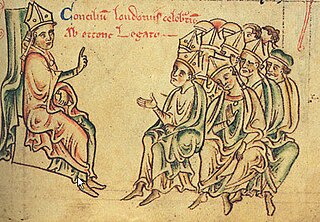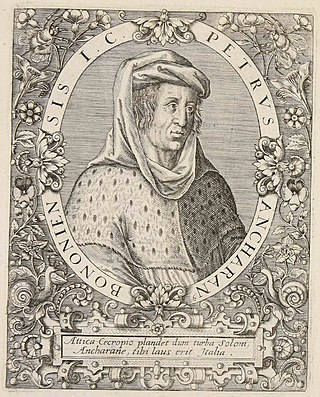
Johannes de Deo [1] (c. 1190 – 15 March 1267) was a Portuguese priest, judge and scholar of canon law who taught for over twenty years at the University of Bologna. He was a prolific writer.

Johannes de Deo [1] (c. 1190 – 15 March 1267) was a Portuguese priest, judge and scholar of canon law who taught for over twenty years at the University of Bologna. He was a prolific writer.
Johannes was called Hispanus , meaning a native of the Iberian Peninsula. [2] He was born in Silves during the brief period when it was held by King Sancho I of Portugal between 1189 and 1191. [3] He refers to himself as a priest, and seems to have been ordained in Lisbon before studying at the University of Bologna. [4] He studied canon law and possibly civil law at Bologna from 1223 until 1229. [3] [4] His main teacher was the archpriest Zoen. [5] He was a professor at Bologna from 1229 until at least 1255. [6] He appears to have been a doctor of both laws. [7] The titles he uses of himself are doctor decretorum (doctor of decrees) and utriusque juris professor (professor of both laws). [2]
In 1241, Johannes acquired a canonry in the cathedral of Lisbon. [3] In 1247, he arbitrated a dispute in Bologna. [2] He served as a judge on several occasions, including on occasion as a judge delegate of Popes Innocent IV and Alexander IV. [5] By March 1260, he had left Bologna to become archdeacon of Santarém in the diocese of Lisbon. [3] [5] He continued to work as an arbitrator and judge in Portugal. One of his cases involved the monastery of Santa Cruz in Coimbra and the philosopher Pedro Julião, the future Pope John XXI. Johannes died in Lisbon on 15 March 1267. [5]
Johannes wrote numerous works in Latin on canon law: [6]
In addition, some glosses on the Arbor actionum of John Bassianus are attributed to Johannes de Deo. [2] Johannes dedicated several of his works to Zoen. Although his work as a whole is not very original, it is valuable to historians for its citations of sources. [5] It was more highly regarded and circulated widely up to the end of the 15th century. There are many manuscripts that carry his work. [3] Johannes Andreae had a low opinion of the Arbor versificata, which he said was so difficult and obscure as to make known things unknown. [6] William Durantis relied heavily on Johannes. [7]
Johannes argued that the Crusades were just wars, that is, wars justified by the right of defence under natural law. [9] His Liber poenitentiarius became the new standard for penitentials. [8]
Few of Johannes' works have been printed. An exception is Principium decretalium, which has been edited by Hermann Kantorowicz. [4]

Afonso III, or Affonso, Alfonso or Alphonso (Portuguese-Galician) or Alphonsus (Latin), the Boulonnais, King of Portugal was the first to use the title King of Portugal and the Algarve, from 1249. He was the second son of King Afonso II of Portugal and his wife, Urraca of Castile; he succeeded his brother, King Sancho II of Portugal, who died on 4 January 1248.

Giovanni d'Andrea or Johannes Andreæ was an Italian expert in canon law, the most renowned and successful canonist of the later Middle Ages. His contemporaries referred to him as iuris canonici fons et tuba. Most important among his works were extensive commentaries on all of the official collections of papal decretals, papal judgments in the form of letters to delegated judges that were at the core of canon law.
Decretals are letters of a pope that formulate decisions in ecclesiastical law of the Catholic Church.

Francesco Zabarella was an Italian cardinal and canonist.

Huguccio was an Italian canon lawyer.

Lupold of Bebenburg was the Bishop of Bamberg from 1353. He is best known for his political writings.
Henry of Segusio, usually called Hostiensis, was an Italian canonist of the thirteenth century, born at Susa (Segusio), in the ancient Diocese of Turin. He died at Lyon.
The Corpus Juris Canonici is a collection of significant sources of the Canon law of the Catholic Church that was applicable to the Latin Church. It was replaced by the 1917 Code of Canon Law which went into effect in 1918. The 1917 Code was later replaced by the 1983 Code of Canon Law, the codification of canon law currently in effect for the Latin Church.
Bernard of Botone was a noted Italian canonist of the thirteenth century. He is generally called Bern(h)ardus Parmensis or Bernard of Parma, from his birthplace Parma.
Guido de Baysio was an Italian canonist.
Antonius de Butrio (1338–1408), also called Antonio da Butrio, was an Italian jurist and a noted teacher of law at Bologna.

Bernardus Papiensis was an Italian canonist and bishop of the Christian Church. Born at Pavia, he studied law and theology at Bologna under Gandulphus and Faventinus. Later, he was provost of the cathedral of Pavia until 1191, Bishop of Faenza until 1198, and then Bishop of Pavia until his death there in 1213.
Geoffrey of Trani was an Italian jurist, known as a canon lawyer. He was a student at Bologna of Azo before becoming a professor at Naples, then at Bologna. He was made a cardinal deacon by Pope Innocent IV. His Summa super titulis decretalium and other writings on decretals became a basic resource for canon law.

Berengar Fredol or Bérenger Frédol was a French canon lawyer and Cardinal-Bishop of Frascati.
The Liber Septimus may refer to one of three Catholic canon law collections of quite different value from a legal standpoint which are known by this title.

Otto of Tonengo was an Italian papal diplomat and cardinal, first as deacon of San Nicola in Carcere from 1227 and then as bishop of Porto e Santa Rufina from 1244.
Rufinus was an Italian canon lawyer, described as the most influential canonist at the University of Bologna in the mid 12th century. He composed a Summa on Gratian's Decretum before 1159, which soon became the most influential commentary in Bologna, surpassing all previous ones in detail and length.

Peter of Ancarano was an Italian jurist. He worked in the tradition of Giovanni d'Andrea. He earned the Latin nickname anchora juris, and was also known as Pietro de Farneto.
The Catholic Church utilizes the oldest continuously functioning legal system in the West, much later than Roman law but predating the evolution of modern European civil law traditions. The history of Latin canon law can be divided into four periods: the jus antiquum, the jus novum, the jus novissimum and the Code of Canon Law. In relation to the Code, history can be divided into the jus vetus and the jus novum. Eastern canon law developed separately.

The Quinque compilationes antiquae is a set of five collections of twelfth and thirteenth century decretals totalling between 1,971 and 2,139 chapters.